The post LIISBETH DISPATCH #40 appeared first on LiisBeth.
]]>
VIEWPOINT
Leading From Inside a Cage
In the first week of February, a new gender equity campaign was launched.
Its name? #WeNeedBoth.
Its purpose? To ensure men were not excluded from panels on diversity. Supporters were encouraged to sign a pledge to ensure that this never happens again on their watch. By February 9, more than 90 A-list, Toronto-based CEOs, tech celebs, plus some of their employees (the majority were male) had signed.
Who founded it? According to media reports, it was founded by four WXN Top 100 corporate women leaders including Annette Verschuren, CEO of NRStor, and Linda Hassenfratz, CEO of Linamar, both of whom also serve on the Canada-United States Council for the Advancement of Women Entrepreneurs and Business Leaders.
The idea was said to be inspired by a more broadly defined gender equity panel pledge campaign in Australia. However, the Canadian adaptation focused on dealing with the apparent problem of too many all-women panels in sessions devoted to gender diversity. (See the screenshot below from February 7, 2018.)

The backlash and snark that followed on social and other media outlets was swift and merciless. Most wondered: On what planet is “not enough men on diversity panels” a problem?; Why the focus on “diversity panels”?; What data support the idea this is a notable problem in Canada (LiisBeth could not find a similar campaign in the U.S.) to the point of requiring a national corporate-led campaign to solve it?
Others were angered at the initiative’s blatant exclusion of trans and gender non-binary people. Fair point. The hashtag handle acknowledges the existence of only two genders.
A week later, red-faced organizers completely rewrote the #WeNeedBoth website and pledge. Now, instead of advocating for more men on diversity panels, signatories are pledging to ensure all genders on all panels.
In essence, #AllGendersMatter. (The screenshot below was taken on February 25, 2018.)
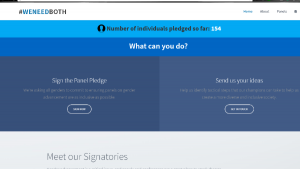
Fast forward to today.
Originally, the co-founders’ names were noted on the website. Currently, the website says the campaign was “founded by a group of women.” So if you wanted your name off the list or wanted to talk to someone about the site, you would have no idea who to call or who will answer the “contact us” email. So much for transparency and accountability.
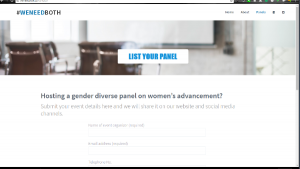
Marketplace Diversity?
Sure, people make mistakes. And the intentions were no doubt good. But one seriously has to wonder how the original campaign won approval by anyone in the first place, especially considering the people involved in creating and supporting it are all known corporate gender equity advocates. Hiding after the fact is not cool, either.
Following the campaign’s criticism, several signatories moved to distance themselves, downplaying their signature or involvement. Some simply said “Oops” on social media but justified their support anyway by saying the overall intent was good. Some signed without reading the pledge at all, saying they were heavily influenced by who else was on the list.
And while the pledge has changed to now reflect a flaccid #AllGendersMatter mindset, the hashtag #WeNeedBoth continues to refer to genders in binary terms. As of today, there are 172 signatures, a lineup that, by the way, looks a lot like the downtown Toronto’s Canadian Club luncheon reservations list.
Marketplace Diversity
The story of the ill-conceived, trans- and queer-excluding #WeNeedBoth campaign could be seen as an example of marketplace diversity (a riff off of Andy Zeisler’s term, marketplace feminism); supporters are quick to buy the feel-good T-shirt without bothering to critically consider the message emblazoned on the front.
One could also conclude this is just another case of corporate elite groupthink. Had any one of the founders, organizers or signatories reached out to oh, say, a woke college student, a staff member who perhaps does not report directly to them, a gender minority activist, or even a feminist of any gender outside of their circles, this embarrassing campaign launch could have been avoided.
Our Take?
The whole thing was just the consequence of lazy thinking and insularity.
I agree that pushing for gender diversity on most panels (not all depending on context) is an important tactic in the fight for gender equality and the advancement of women, especially if the women are actually allowed to hold the mic for more than a minute.
However, prioritizing gender diversity on panels without also prioritizing diversity of thought is a job only half done. Two people of the same gender with courage, free voice, combined with a non-colonial, non-heteronormative, wide-angle viewpoint are far more valuable on a panel than hearing from man and a woman who exist in the same cage, worry about conforming, and overall think alike.
The story of #WeNeedBoth shows that corporate leaders need to work harder at cultivating connections that go beyond their comfort zones if they really want to participate in, or be recognized for, moving the dial.
Our Panel Pledge?
If you ask me, a truly powerful corporate panel on the subject of gender equity and minority gender advancement would not only include people with testes, ovaries, both, or none, but also people from other walks of life like feminist artists, gender justice and labour lawyers, political activists, women’s labour historians, gender minority community leaders, indie media journalists, writers, filmmakers, and new knowledge creators (women’s studies or gender studies academics), many of whom have been working at the margins of power on this issue for decades.
I would also support a pledge that said that panelists cannot have participated on a similar panel topic within the same year. It seems the same people are on the same panels, all the time. Yawn. Let’s work harder to keep the discourse sparky and fresh.
Imagine. Just one phone call to just one person who does not work on Bay Street and the entire #WeNeedBoth fiasco could have been avoided. Remember, no one can truly drive social change from inside a gilded cage.
THIS MONTH ON LIISBETH

Feminist Bookstores Make a Comeback
Yes, feminism is a robust political movement. But it is also a major field of research, a community, and a complex worldview.
Feminism is also the foundation for much of today’s discussion on corporate-led diversity and inclusion. In fact, LiisBeth argues that feminism is the new management science of our time. We also believe that feminist thinking is, in fact, the new “design thinking” and that all future leaders will need to learn how to wield a feminist lens to succeed in the emerging era.
Perhaps it’s not surprising then that the feminist bookstore, armed with new technology, sources of funding, and an intersectional attitude, is making a comeback. This is good news as there is no better way to learn about feminism and its many facets than by becoming a patron of a feminist bookstore.
To learn more about the re-emergence of feminist bookstores, or how to become part of this kind of community of practice, read this month’s feature story, “The Reinvention of the Feminist Bookstore” by new LiisBeth contributor, Cecilia Keating.
LIISBETH FIELD NOTES
Boss! Boss! Da Budget! Da Budget!
Yesterday the Canadian federal government released its 2018 budget and whoa, it demonstrates a real commitment to improving support for women entrepreneurs. Sure, the devil’s in the details. And when it comes to programming, we pray that the money will go to women-led programs, and not just to incubators and accelerators with an “add women & stir” (Thank you Barb Orser!) approach.
Achieving its intended effect will be hard work. But from where we sit, it’s an awesome move forward.
We can’t wait to see the Ontario provincial budget which is coming next. Ontario is still the only province without a women’s enterprise strategy. Keep your fingers crossed that this will change.
In the meantime, watch for LiisBethian reader’s thoughts on the budget on our website in the coming days. If you did not have time to read the whole thing, here is a handy printable summary:
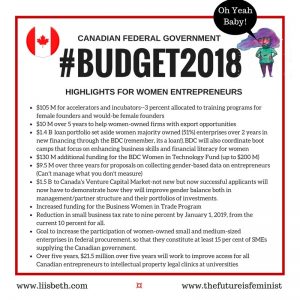
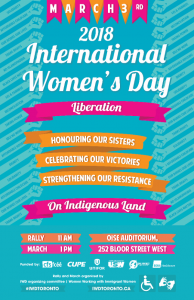
It’s International Women’s Day on March 3
What’s the difference between the March 3 International Women’s Day (IWD) March and the January 21 Women’s March?
Well for starters, the IWD March has been around for more than 100 years compared to just two years for the U.S. election–inspired Women’s March that’s now held in January. From having attended both over the past two years, I noticed that the IWD March is much smaller, but the message it sends is no less important.
Depending on the country and organization, this year’s theme varies in title but not in overall intent.
For example, the U.N.’s IWD 2018 theme is “Time is Now: Rural and urban activists transforming women’s lives.” This theme echoes “the priority theme of the upcoming 62nd session of the UN Commission on the Status of Women, International Women’s Day will also draw attention to the rights and activism of rural women, who make up over a quarter of the world population and majority of the 43 percent of women in the global agricultural labour force…”
In the U.K., the theme is #PressforProgress, which is “a nod to the growing global movement of advocacy, activism and support surrounding gender parity and sexism.” Inspired by the #MeToo and #TimesUp movements, the aim of the theme is to encourage people to continue the vocal fight for equality.
In Canada it’s #MyFeminism. The Canadian theme is focused on celebrating and recognizing the role feminism and feminists have played in shaping Canadian life.
If you missed the January 20 march, here is your chance to show lawmakers and politicians that this time, the fight for gender equity is not going to recede into the background—ever again.
If you cannot attend the march this weekend, check the long list of International Women’s Day events happening in your area.
LiisBeth hopes to see you there in Toronto. Information about the Toronto march can be found here. If you are looking for information on the IWD march in your particular country or city, click here.

Can I Wear My Pink Pussy Hat to the IWD March?
It’s true. The pink pussy hat became controversial during the January Women’s March. Some argued the symbol was trans exclusionary (not everyone has a pussy). Others said it was racist because not all pussies are pink. That’s why so many women left their pussy hats behind.
But not all. Some choose to interpret the symbol on their own terms. Others just reinvented the hat by knitting new ones that were multicolour (see photo above from the January Women’s March in Toronto).

New (and Only) Canadian Women’s Chamber of Commerce Launched!
After four months of focused efforts, and with the input of Women on the Move‘s Heather Gamble, Trista DeVries, and Nancy Wilson officially launched the first Canadian Women’s Chamber of Commerce (CanWCC) in January 2017 in response to the observation that Canada did not have one—though many other countries did.
The organization launched with over 60 members and aims to have over 1,000 by the end of 2018.
Why should women sign up?
DeVries remarked, “The first reason to sign up is simple: advocacy. Until now, there has been no national Chamber of Commerce advocating specifically for women’s economic priorities. The second reason? Women-led businesses have unique needs and the CanWCC is dedicated to addressing those needs.”
While the word “women” is in the organization’s nameplate, DeVries assures that the organization is committed to inclusive and anti-discrimination practices in relation to all transgender women, intersex women, genderqueer women, and non-binary participants.
When it comes to the group’s advocacy agenda, DeVries says that this is currently evolving as they discuss priorities with members and other women-led business organizations like the Women’s Enterprise Organizations of Canada (WEOC) over the next few months.
If you are interested in joining, click here. Membership rates start at $100 for businesses.

Innovate or Die
We all know women founders are underrepresented in science- and technology-led startups. But what’s more startling is that because there are few women in these spaces, many conclude that women are somehow less capable of or interested in innovation-based entrepreneurship.
Thankfully, Clare Beckton and Janice McDonald of The Beacon Agency just released a new study that proves this belief is pure bunk.
McDonald says that the 146 women interviewed were very clear: “If you don’t innovate, you die.”
It follows that if we cannot find a way to better support women-led innovations or enterprises, our economy’s potential will be forever under-realized.
WHAT WE’RE READING
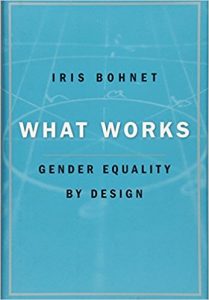
Diversity training programs have had limited success, and individual effort alone often invites backlash. Behavioral design offers a new solution. By de-biasing organizations instead of individuals, we can make smart changes that have big impacts. Presenting research-based solutions, Iris Bohnet hands us the tools we need to move the t caption text here. Use the block’s Settings tab to change the caption position and set other styles.

Talaga has written Canada’s J’Accuse, an open letter to the rest of us about the many ways we contribute ― through act or inaction ― to suicides and damaged existences in Canada’s Indigenous communities. Talaga describes gaps in the system large enough for beloved children and adults to fall through. It is impossible to read this book and come away unchanged.” ― RBC Taylor Prize Jury Citation
IN CASE YOU MISSED IT!
- The Canada-United States Council for the Advancement of Women Entrepreneurs and Business Leaders has released its first report. The key message? Leverage government and corporate procurement to help grow women-led enterprises. The next two reports are scheduled to be released in March.
- Further on the subject of directing a set percentage of procurement dollars to women-led enterprises, we encourage you to read this informative paper co-authored by Dr. Barbara Orser, Allan Riding and Julie Weeks in December 2017 titled “The Efficacy of Gender-Based Federal Procurement Policies in the United States.” The U.S. has had such policies in place for some time. The Council is recommending Canada adopt a similar policy. This paper points out that implementation is not as easy as it looks.
- Did you know LiisBeth compiled a terrific feminist entrepreneur reading list with the help of Feminists@Work? To download this must-have list for all feminist entrepreneurs, click here.
CAN’T MISS EVENTS
-
Building an Inclusive Enterprise: A Brief Introduction to the Feminist Business Model Canvas
Wednesday, March 7, 2018
6:30–8:30 PM
Women on the Move
2111 Dundas St. West, Toronto
Cost: $25 -
Building An Inclusive Enterprise: The Feminist Business Model Design Jam. Thursday, March 8, 2018
9:00 AM–3:30 PM
600 Rossland Road West, Oshawa, ON
Sponsored by LiisBeth and presented by Feminists At Work
Cost: Free! Register here. -
SheEO Canadian Activator Summit and Gala
Monday, March 5, 2018
9:00 AM–8:30 PM
The Symes
150 Symes Road, Toronto
Cost: $100–$150. Register here. - Toronto Women’s Entrepreneurship Forum
Friday, March 9, 2018
9:00 AM–4:00 PM
Toronto City Hall, Council Chambers
100 Queen St. West, Toronto
Cost: Free! Register here. - The Gender Revolution: Implications for Organizational Leaders
Saturday, March 10, 2018
9:00 AM–4:30 PM
Centre for Social Innovation, Queen’s University
Goodes Hall, Kingston
Cost: $99. Register here. -
CryptoChicks Hackathon and Conference
Friday, April 6 to Sunday, April 8, 2018
MaRS Discovery District
101 College St., Toronto
“This is an open invitation to take part in a bold blockchain event. Women are underrepresented in the crypto space and with your help, we want to change that.”
Cost: $50–$500. Register here.
That brings us to the end of our January/February combined newsletter.
Watch for additional new feature articles on feminist outsourcing plus more in March on our magazine site at www.liisbeth.com.
If you are looking for an easy way to support feminist entrepreneurs for International Women’s Day on March 8, look no further than considering a subscription to LiisBeth! We humbly remind you that subscriptions are $3/month, $7/month or $10/month.
We accept PayPal and credit cards. And we also now have a Patreon page!
Funds go directly towards paying writers, editors, proofreaders, photo permission fees, and illustrators. LiisBeth needs your love—and financial support.
The next newsletter is scheduled for late March 2018. In the meantime, enjoy the better weather! And we’ll see you out and about on International Women’s Day!

Petra Kassun-Mutch
Founding Publisher, LiisBeth
The post LIISBETH DISPATCH #40 appeared first on LiisBeth.
]]>The post LiisBeth Dispatch #26 appeared first on LiisBeth.
]]>
VIEWPOINT
When I asked LiisBeth contributor Anne-Marie Hood about what inspired the art she created for this week’s newsletter cover (above), she replied “Unlike paint, the materials and method used to create this work (cardboard, paper, yarn, felt and foam), like our gains as women, are not designed to stand the test of time. Our ideas and ideals are as organic as any growing form. Without nourishment, even the strongest roots can collapse. The much longed for light in the darkness may be revealed for what it is: a mirrored reflection off an intact glass ceiling.”
During Prime Minister Trudeau’s first meeting with President Trump at the White House on Feb. 13 a new cross border initiative to advance women entrepreneurs was announced. As I followed the news about it, I could not help but think about Hood’s words and how they applied to this new women’s initiative.
A Spark of Light in the Darkness?
Initially, I was energized to hear that women entrepreneurs would be on the Prime Minister and President’s agenda for their first meeting. Could this be a seed for change that stands the test of time or would it be just another women’s policy tumbleweed? Soon after, and as more information came to light, the pleasant adrenal high subsided. Too many red flags.
What’s in a Name?
One of the first things you learn in business is to get the name right. It’s a sign of respect. So what does it tell us when people keep messing up the stakeholders in the name of the newly appointed council?
The official White House press release issued on Feb. 13 referred to it as the “Canada-United States Council for Advancement of Women Entrepreneurs”. On the same day, in the official joint statement issued by the Canadian government it was named the the “Canada-United States Council for Advancement of Women Entrepreneurs and Business Leaders.” Then on Feb. 14, Canadian Business magazine along with several other news outlets (Macleans, CBC, Associated Press, Fortune magazine and Fox News) announced it as the “United States Canada Council for the Advancement of Women Business Leaders-Female Entrepreneurs.”
It seems like no one really cared if the council was created to advance women entrepreneurs, women in the workplace, business leaders, or all three, as long as it said women somewhere in the title. Not taking the time to carefully consider the named stakeholders for this initiative indicates that it was likely hastily and/or not well crafted and validates the view that this council was created to achieve pop up political goals. And given little has been announced since, it is starting to look more and more like a tumbleweed indeed.
What Does the Roster Tell Us?

Diversity pundits argue that to best serve the market, one must employ the market. This is because socially diverse groups are more innovative than homogeneous groups, especially when it comes to solving complex problems. But ensuring optimal diversity on several levels when appointing the members of this council was evidently not a priority. For instance, there is only one person of colour on the council.
Furthermore, based on the internet bios available, it appears that none of the people designated to the Canadian seats (five out of ten) have ever been entrepreneurs. On the U.S. side, only two out of the five have founded or co-founded a company: Ivanka Trump and Canadian Annette Verschuren (we are not sure why a Canadian was listed as a member on the U.S. side) even if both did so under profoundly privileged circumstances.
Also, all council members represent companies that are already exporting or importing from the U.S.
The makeup of the council indicates that the selection process prioritized large, well-established corporations with cross-border business interest or perhaps just familiar faces. It also shows that the government officials who organized this initiative see women entrepreneurs and corporate careerists as interchangeable constituencies with indistinguishable concerns. The thing is, they are not the same at all.
Women entrepreneurs and employed women experience the economy and work life very differently. For example, one takes personal financial risk and founds companies, the other works for companies. The former cares deeply about things like equitable access to venture capital, and the impact of small business tax rate hikes; the latter cares more about women’s representation on corporate boards and prospects for women’s career advancement. And while both may share experiences and concerns about sexism and gender-based discrimination, they have entirely different concerns and ergo priorities when it comes to directing policy.
Surely our talented MP Chrystia Freeland and Trudeau’s Chief of Staff Katie Telford could have found at least one smart, Canadian woman founder/entrepreneur who typifies the entrepreneurship experience to join the council, even on short notice.
Forest of Collapsed Roots?
No one yet knows what this council will do, or even can do. Some reports say its creation was simply based on political opportunism and its only impact will be symbolic in nature. In other words, it will amount to nothing more than a well-planned dodge. Other media outlets referred to it as a task force.
Whatever this council ends up doing, I, along with Arlene Dickenson, sincerely hope the latter is not going to be the case. We don’t need another task force on this subject in Canada. We have had plenty. Consider the 2003 Prime Minister’s Task Force on Women Entrepreneurs, the Task Force for Women’s Business Growth report published in 2011, the Expert Panel on Championing and Mentorship for Women Entrepreneurs in 2014, or more recently, the Women Entrepreneur Ontario Collective report published November 2016, just to name a few.
Of them all, the 2011 report is the most recent, comprehensive, large-scale collaborative effort led by a national and non-partisan consortium of prominent women business owners, service agencies, academics, and industry associations. Yet, as of 2017, 2011 Task Force Chair Barbara Orser reports that few of the recommendations, which not surprisingly are similar to recommendations of prior task forces, have been implemented.
And as Canada continues to delay implementing policies and supports that could be of tremendous value to women entrepreneurs and our economy, we also find ourselves falling behind globally. In a new book, The Routledge Companion to Global Female Entrepreneurship, to be published in April 2017, chapter contributor Barbara Orser cites compelling research that shows “while Canada is among leading nations with respect to gender equality as it pertains to employed females, this is not the case for policies to support women entrepreneurs.” In other words, in Canada, we do more for addressing equality issues for employed women that we do for women entrepreneurs.
Orser also argues in the book that one of the reasons for government indifference to the specific needs of Canadian women entrepreneurs is the lack of advocacy, an issue which was identified in 2003, and every task force since.
Nourishing New Seeds
The questions raised by the creation of this council tell us that, like the other initiatives that came before it in which recommendations were not acted upon, perhaps we are just hurtling towards a light that is really just a mirrored reflection of Hood’s ever “intact glass ceiling”. In other words, initiatives like these, including ones far more seriously contemplated, will likely continue to fail because they are set down in a society that has still not yet truly grappled with its deeply rooted cultural and social gender biases.
Nevertheless, on the positive side, the creation of the council is at least something, even if only a small seed tossed onto stoney ground.
And there is a way that we, LiisBethians, can help nourish this seed and increase the likelihood that this initiative can produce positive, lasting outcomes for women entrepreneurs.
Let’s take out our pens and write MP Chrystia Freeland,([email protected]) plus the five Canadian members of the council to ask for their commitment to help implement the recommendations of prior task forces within the next few years. Their contact information can be found here.
But we better do it fast, because who knows if this Council will last for real beyond the day that it met.
THIS WEEK ON LIISBETH

If you missed our presentation and panel at the Feminist Art Conference held on Saturday, Jan. 21, have no fear, a podcast of the entire presentation is now here!
In this 80-minute session, the panelists explored the intersections between gender, entrepreneurship and innovation and how gender shapes entrepreneurial choices, support, access to capital, and the overall experience.
The panelists included Renish Kamal, founder, Fidget Toys, Priya Ramanujam, founder, Urbanology Magazine, Emily Rose Antflick, founder and chief community cultivator, Shecosystem, Allison Hillier, serial entrepreneur and instructional designer, and Valerie Fox, founder, The Pivotal Point.
Great listening for your next run or walk! To hear the podcast now, click here. To download the podcast from our website click here.
FIELD NOTES

R.I.P Julie Rae Weeks: Last week, a leading advocate for women’s rights and entrepreneurship around the world, Julie R. Weeks died on Feb.18, 2017 at the age of 59 as the result of brain cancer. Julie served as Director of Research at the Center for Women’s Business Research in the U.S., Executive Director of the National Women’s Business Council, which advises the U.S. Congress, and Small Business Advisor for the President of the United States. As President and CEO of Womenable, Julie’s national and international activism led her to board positions with: The Association of Women’s Business Centers, for which she served as chair; Enterprising Women Magazine; Global Banking Alliance for Women; International Council for Small Business; International Journal of Gender and Entrepreneurship; the National Association of Women Business Owners; and WEConnect International. She also served as a Strategic Advisor to Quantum Leaps.
Barbara Orser, a colleague and sometime co-author with Julie says “Julie Weeks was a visionary and connector. She was a thought leader who taught us that all nations must do more to support women’s social and economic rights. Womenable has played a critical role in connecting the global community of researchers, practitioners and policymakers. Her legacy is evidenced in many of the organizations that have made the U.S. a leader in supporting women entrepreneurship. She will be very, very missed.”
For information about her funeral, including webcam access view http://www.reynolds-jonkhoff.com/obituaries/Julie-Weeks/#!/Obituary

This week, SheEO announced its first group of U.S. venture investees! They include ABL Denim, Callisto, Embrace Innovations, Kitables, and The Town Kitchen. For detailed information, visit SheEO.
The 2017 slate of Canadian SheEOs will be announced at the SheEO gala in Toronto, Monday, March 6.

WEConnect Canada has a new Country Director! Chelsea Prescod, former director with Pepper & Lemon, a digital creative strategy enterprise took on her new role in January.
Astrid Pregel, the former head of WEConnect, has moved on to a position with WEConnect International. The corporate-led non-profit, facilitates inclusive and sustainable economic growth by empowering and connecting women business owners globally. It identifies, educates, registers, and certifies women’s business enterprises that are at least 51 per cent owned, managed, and controlled by one or more women.
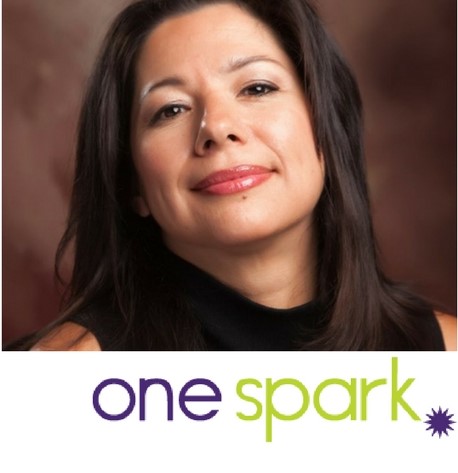 This week LiisBeth spoke with Yudit Timbo of One Spark, an organization based in Hamilton that provides barrier-free opportunities for women experiencing violence to generate income through entrepreneurship. To find out more visit their website here.
This week LiisBeth spoke with Yudit Timbo of One Spark, an organization based in Hamilton that provides barrier-free opportunities for women experiencing violence to generate income through entrepreneurship. To find out more visit their website here.

Recommended Reading for Feminist Entrepreneur Policy Geeks
If you are interested in how different feminist outlooks position women in the economy, and how they in turn influence policy making for women’s entrepreneurship in Scandinavian countries, the paper titled “In the name of women? Feminist readings of policies for women’s entrepreneurship in Scandinavia” will be of significant interest.
The paper discusses the presence or absence of feminist theory in research on women’s entrepreneurship, includes definitions of feminist approaches to entrepreneurship and compares women’s entrepreneurship policies in Scandinavia. Not surprisingly, the paper points out that most policies give precedence to neoliberal-style economic growth objectives, and tend to position women as in need of “fixing” and a means to this end. It begs the question, what would entrepreneurship look like for women if guided by alternative feminist outlooks? A shout-out to Barbara Orser for alerting us to it. You can find it here.
In addition, Statistics Canada released a report in November 2016 titled “A Comparison of the Performance of Majority Female-Owned and Majority Male-Owned Small and Medium-Sized Enterprises“. The study examined the impact of gender on enterprise performance for the years 2011 and 2014 on a handful of variables. The key finding? In 2014, women are just as innovative as males. Halleluja! Also, the study says banks today are treating women entrepreneurs looking for debt financing more equally than they did in 2011. This is progress?
What the study doesn’t look at is what percentage of total venture debt financing overall goes to majority-owned women firms in Canada. In her recent presentation in December in Ottawa, Dr. Candida Brush reported that in the U.S., only 4.4 per cent of the total dollars lent to small businesses went to women-led firms. In 2007, Statistics Canada found that “Majority female-owned firms were just as likely to seek to finance as majority male-owned firms in 2007 but were less likely to be approved for debt financing than majority male-owned firms.” So while women might no longer be paying more to fund their ventures than men, the study does not note what % of all lending goes to women.
As is the case with comparing statistics, the devil is in the methodology.
CAN’T MISS EVENTS
- March 2: She Started It: A Film Screening, JLABS in Toronto, 5 to 8 p.m. “She Started It” is a new documentary film that follows five trailblazing young female entrepreneurs through their journeys of entrepreneurship. To register, click here.
- March 2: AGO’s March First Thursday theme: Still Nasty. The future is Feminist (LiisBeth agrees!) This March, the AGO partners with OCAD University to present a special edition of First Thursday guest curated by OCAD’s graduate class in Criticism and Curatorial Practice. The night’s program aims to explore, through a feminist lens, a future that imagines possibilities for diversity of representation and experiences—a future that is more open, more free, more feminist, and non-deterministicAdvance Tickets: $13 Non-Members / $11 AGO Members*At the Door: $16 Non-Members / $14 AGO Members.7 – 11:30 pm 19+ (ID required) / Cash Bar
- March 7: No Safe Space: Harassment of Women in Media by the Canadian Journalism Foundation, Tuesday, March 7, 2017 from 6 to 8:30 p.m., TMZ Broadcast Centre, Toronto. It is not just Internet trolls. These days, it is often not safe for women to speak up anywhere — online, on air and in print. What can be done about the barrage of intimidation, threats, and abusive comments that seem determined to silence our voices? In the lead up to International Women’s Day, we tackle online harassment against women in media. Register here.
- March 8: It’s International Women’s Day! Check out events in your city!
- March 9: Indigenous awareness training seminar hosted by LiisBeth and Women on the Move in partnership with Bear Standing Tall and Associates, and Juno award-winner Brenda MacIntyre, 2111 Dundas Street West, Toronto, 5 to 8:30 p.m. The three-and-a-half-hour holistic seminar using the medicine wheel framework covers topics including the Truth and Reconciliation process; treaty relationships 101; and challenges created by Canada’s Indian Act and how it affects indigenous women; plus the status and challenges faced by indigenous women entrepreneurs (51 per cent of indigenous women either wholly or partly own a business in Canada versus 47 per cent of non-indigenous women). $35 ($25 for LiisBeth member subscribers). To register, click here.
- March 11-12: Indigenous Women’s Entrepreneurship BootCamp – The Aboriginal Women’s Business Entrepreneurship Network (AWBEN) and Pow Wow Pitch, led by Sunshine Tenasco is hosting two days of entrepreneurial coaching in Ottawa on Saturday, March 11 and Sunday, March 12. The program’s goals are to provide a safe, supportive, collaborative, empowering and culturally supportive environment that addresses the unique challenges of female Aboriginal entrepreneurs and aspiring female Aboriginal entrepreneurs, and to promote community leadership as a reflection of respect and reciprocity. The program is accepting 20 indigenous entrepreneurial women and registration is free. You can register here.
- March 16: Roxanne Gay, author, introduces her new book Feminism & Difficult Women, Toronto Public Library, 7 to 8:30 p.m. To register, click here.
- April 28: HOLD THE DATE! LiisBeth will soon be releasing details about the long awaited Feminist Business Model Canvas Workshop to be held in Toronto at the Centre for Social Innovation at 720 Bathurst. Limited space.
That’s it for this week! And if you are not already doing so, please consider increasing your support of what we do in the form of a paid subscription. Subscription options are $3/month, $7/month and $10/month. We accept PayPal and credit cards. Funds go directly towards paying writers, editors, proofreaders, photo permissions and illustrators.
Our goal is to get to 1,000 email subscribers by March 31!! So please share this newsletter to those you know who might be interested.
The next newsletter is scheduled for March 14.
See you in two weeks!
Be fearless,

The post LiisBeth Dispatch #26 appeared first on LiisBeth.
]]>